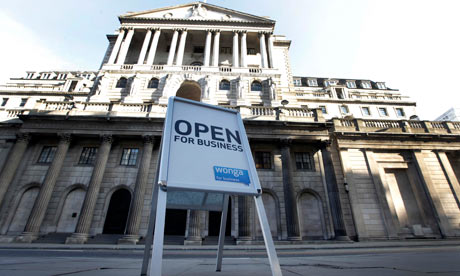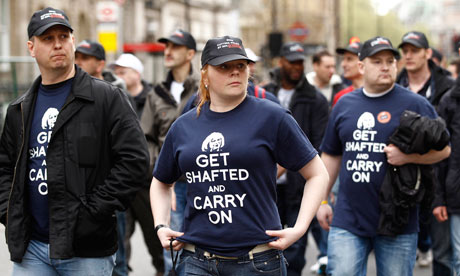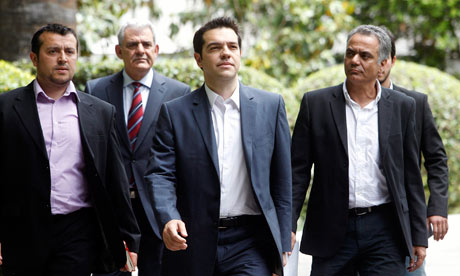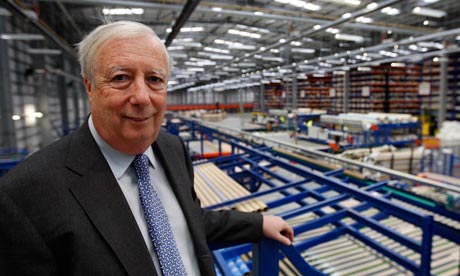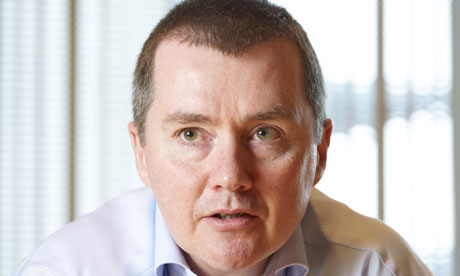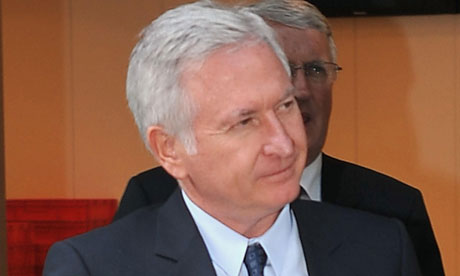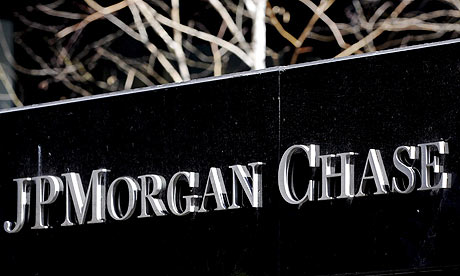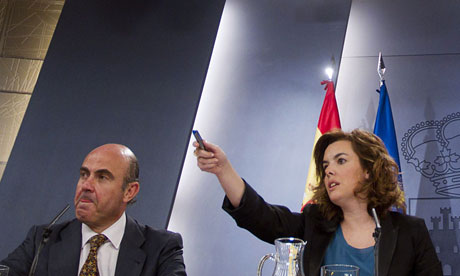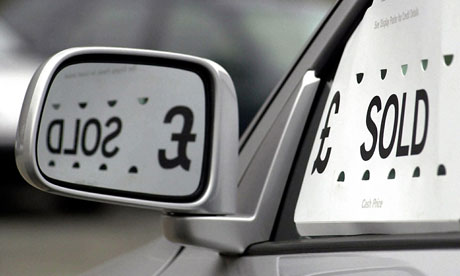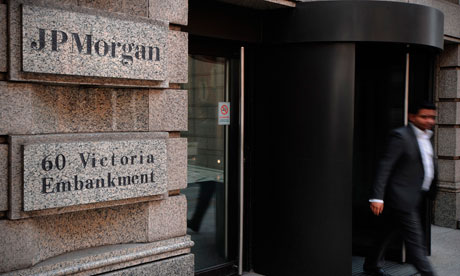

JP Morgan's London office. Photograph: Carl Court/AFP/Getty Images
The City trader at the centre of a $2bn trading loss at JP Morgan Chase had returned to his home in Paris on Friday as the repercussions of the loss spread across the markets.
Some $13bn was wiped off the value of America's largest bank after it admitted the scale of the trading activities of Bruno Iksil – nicknamed the London Whale for his bullish trading – and his colleagues in the bank's little known "chief investment office". The US Securities and Exchange financial watchdog was said to have begun reviewing the losses.
Contacted by the Guardian, Iksil was reluctant to comment. He was thought to be in Paris and said: "I cannot talk about it. You will have to speak to the bank's representatives."
The banker, who is understood to be married with four children, spends Monday to Thursday in London, staying in a flat in Earls Court, returning to France on Fridays. According to his profile on the Bloomberg trading platform, he says he is "walking over water and humble".
A graduate in engineering from the École Centrale in Paris 20 years ago, Iksil had become so well known in the opaque $10tn market for credit default swaps – a complex type of insurance product – that he was nicknamed the "London Whale" and also known as Voldemort, after Harry Potter's nemesis.
Iksil is thought to be one of the highest-paid bankers in London and his New York-based boss, Ina Drew, whose pay has to be published, received $14m last year.
The Financial Services Authority has been informed and will liaise closely with the bank, which had earned an unrivalled reputation for navigating successfully through the 2008 banking crisis.
Before the shock announcement, JP Morgan chief executive Jamie Dimon had been key in persuading the US government to water down new regulations, in particular the so-called Volcker rule that aims to limit risk-taking by banks considered "too big to fail".
US representative Barney Frank, a Democrat who gave his name to the 2010 Dodd-Frank law on regulation, said: "This regrettable news from JP Morgan Chase obviously goes counter to the bank's narrative blaming excessive regulation for the woes of financial institutions." He added: "The argument that financial institutions do not need the new rules to help them avoid the irresponsible actions that led to the crisis of 2008 is at least $2bn harder to make today."
Senator Jeff Merkely, another Democrat, said: "This really is a textbook illustration of why we need a string Volcker rule. In the words of JP Morgan's chief executive, he had a strategy that was, quote, 'flawed, complex, poorly reviewed and poorly monitored'. And if that sounds eerily familiar, it's because it is an exact description of the type of risk-taking that got us into this financial crisis and recession."
Iksil was part of team based inside JP Morgan's London head office, which was supposed to hedge – or insure – the risks the bank was running.
The biggest was credit risk, essentially, the chance of customers failing to pay their bills – and the bank had recently embarked on a new strategy to hedge this risk.
Iksil was one of a number of traders involved in this strategy, but he has turned out to be the most high profile ever since the size of his trade in credit default swaps attracted the attention of his rivals.
His positions were so large that he was said to be moving prices in this market. In particular, Iksil offered insurance against companies defaulting on an obscure index of 125 companies known as CDX IG 9. The companies on the IG 9 index were as varied as Campbell's Soup, Time Warner and Walt Disney. During his time at JP Morgan, Iksil is reported to have generated $100m, and is usually known for his bearish stances, performing particularly well during downturns.
There is thought to be more than one high-profile trade behind the losses – which the bank has admitted could escalate. JP Morgan is being selective about the information being disclosed because its rivals might try to move prices against it as it attempts to unwind the trades.
Reports of Iksil's risky transactions first surfaced in the US a month ago, but were dismissed by Dimon as "a complete tempest in a teapot". But in a hastily arranged conference call to investors on Thursday night he said: "The portfolio has proved to be riskier, more volatile and less effective as an economic hedge than we thought. There were many errors, sloppiness and bad judgment." He admitted he had "egg on his face".
The bank usually makes $5bn profits per quarter and should make up the lost ground.
Shares fall
Bank shares were knocked as dealers digested the $2bn (£1.2bn) of losses uncovered by JP Morgan Chase and the implications for regulatory reforms. Barclays lost 2.8%, while Royal Bank of Scotland fell sharply before recovering most of its losses. US banks such as Morgan Stanley and Goldman Sachs were down 4.5% and 3% respectively. Ian Gordon, banks analyst at Investec, said the share slumps were caused by "the random fear that it could happen elsewhere and prompt a more severe regulatory response". A spokesman for the Treasury said the losses justified the need for a "ringfence" between retail and investment banking, as recommended by Sir John Vickers.

